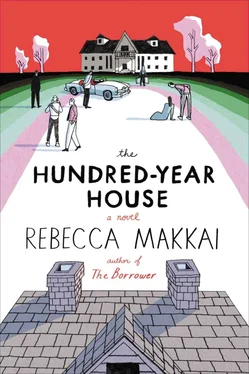He was devastated, she could tell. However difficult it was for him to say all this, he’d been counting on her understanding, on some kind of validation.
“This place doesn’t want me,” he said. “It’s rejecting me. Like a transplanted organ.”
“You shouldn’t be here. You should go back to Texas.” She said it purely out of concern, and only afterward remembered that this was what she’d wanted all along.
He blinked down at the vodka. “Miriam won’t leave. This is the happiest she’s ever been. This is the best work she’s ever done.”
She wished she could tell him that it wasn’t the house, that Miriam was only happy because she was in love with Doug, and it was the wrong kind of happiness. But she couldn’t do that to him right now. “Tomorrow, if the world doesn’t end. Bruce will loan you guys money, right? Go home and get healthy.”
But now Gracie was in the doorway saying “ There you are,” and asking who would join Bruce for a spin in the ’57 Chevy “before the streets get dangerous.”
Case said he would, and he handed Zee the vodka and walked from the room like a broken marionette. Zee went back to the dining room, where Miriam and Doug both still sat. Their whispering stopped the moment she appeared. But she wasn’t there for them , she wished they knew. She walked around to the back wall, to the portrait of Violet. If the artist had been less skilled, her great-grandmother might have remained as flat and uninteresting as any other ancestor. Instead, her skin glowed and her mouth hovered before some small movement, as if she were just now about to say something she’d held in these past hundred years. Zee tried to look at Violet straight on, but Violet was always looking somewhere else.
It was frustrating. Because (and maybe it was just the vodka) Zee needed that moment of silent communication. She had a question for Violet today, a hypothesis she wanted confirmed in this most unscientific of manners. You aren’t even the ghost, she wanted to ask, are you? Something drove you crazy in this house, and it’s the same thing killing Case, and it’s the same thing driving me mad. Everyone in this house is crazy. And look at the blown-out window, the strangling ivy. It isn’t you. This is why I felt fine in Pennsylvania. Something’s wrong with this house. Something’s broken. Things don’t work normally here. (If the semester weren’t over, she’d float the idea by her seminar: not a haunted house, a haunting house.)
But Violet avoided her eyes.
At ten thirty, fortified by bourbon, Doug asked Gracie if he could speak to her in the solarium. Gracie had been drinking champagne since six, and Miriam had made sure to refill her glass every time it was even halfway empty, till she was wobbly and glassy-eyed. Miriam ran interference now on everyone else, making sure they stayed in the den, where the TV replayed the celebrations from the International Dateline and points west. Doug and Gracie sat on the long white couch and he said, “I have an offer for you. A good one.”
She looked skeptical. She said, “If this is about your employment situation, I can’t do more than I already am.”
“No. It’s — I think you know that I’ve been in the attic.”
Her hand fluttered to her forehead.
“I shouldn’t have, I know, but please understand how important this is for me. Those archives are the whole meat of the book. But I’ll get back to that.” He pushed his fists into his knees. “While I was up there, quite by accident, I also found some personal papers of yours.”
“Oh, Douglas.” She started looking for her champagne glass. Doug found it on the floor and handed it to her.
“And I did figure some things out. I want to help you. In exchange — I mean, I know you’re nervous about the Internet. I checked, and it’s already out there. It says you’re seventy-four. We can’t change what’s already there. But if it’s important to you, there are ways to create alternate timelines, to get those circulated as well, to confuse things. I have a friend who does Internet stuff. I want to help you. I do.”
Gracie leaned back, her eyes closed. She looked pale — fine wrinkles on top of tissue-paper skin on top of a sudden gray bloodlessness — and he felt he should be taking care of her, getting her a blanket, rather than tormenting her like this. But then she sat up and leaned toward him. She tapped his leg.
“Douglas, you’re clever. And I’m smarter than I seem. I want you to know that.”
“I’m sure we can strike a reasonable bargain.” He was glad Miriam and Leland weren’t there to hear how ridiculous he sounded.
“Those papers are just a joke. People with our kind of wealth, we need other documents sometimes. Alternate documents.”
“But that would be illegal.”
“Not at all. Bruce is smart with these things, and he has lawyer friends.”
“Gracie, I’m talking about old documents. Long before you knew Bruce.”
Miriam had told him just to stare Gracie down if he was at a loss. He pressed his thumbs together and looked right at her. She gave a high laugh, a sound like a teacup hitting the floor.
“Well. Are you trying to ask for money, Douglas? You’ve never been direct.”
“I just want the colony files.”
“What files?”
He said, with as much conviction as he could summon, with an edge of threat that surprised him when he heard it: “The Parfitt files. You know exactly what I mean, because you’re the one who replaced them.”
Gracie looked furious now, which was at least a development, if not an admission. She said, “I don’t know what on earth you’re talking about. Replaced them!”
“I went searching, and instead of what I should have found—”
“Douglas, I’ve been good to you.”
“And that’s why I know we can help each other.”
“What precisely did you find?” The downside of her champagne consumption, he realized, was that she’d become difficult to read. He didn’t want to anger her further by implying that her father was gay, so he tried to word things carefully.
“I found — I mean, you must know. It was those two people who — I don’t know who they were, exactly. Two people, here at this house. Doing something very strange, very unorthodox. You do know what I mean. And please don’t lie to me.”
Gracie took a breath so deep that Doug worried about her ribs. “The world’s about to end, isn’t it? One way or the other.” She was so small on the other end of the couch. She said nothing for a long time, and Doug wondered if the question wasn’t rhetorical after all. Then she said, “But you have to understand that there was no point calling the police. Douglas, there was a lipstick mark halfway down the top of her dress. That’s how far her neck had snapped. The car was like an accordion.”
Doug had the horrible feeling that he’d jumped down the wrong rabbit hole, that the prospect of Edwin Parfitt was growing dimmer and dimmer as he fell. All he could think to say was “Oh.”
“It was the worst thing I’d seen in my life.” She was crying, he saw with horror. Her eyes were pink. He felt like hyperventilating himself, and it was only his utter confusion that kept him pinned to the couch, that kept him from breaking down over lipstick and accordions himself. “But you do know it was an accident. I’d die if you thought otherwise. Max would never have let him take the car if he knew Grace was in it. He didn’t answer the phone — he wouldn’t answer the phone — but he didn’t know it was her .”
There was a paper napkin in Doug’s pocket, and he unfolded it and handed it to her and tried to rewind those last sentences, tried to guess whether speaking of herself in the third person was a rhetorical flourish or a sign of mental breakdown.
Читать дальше












